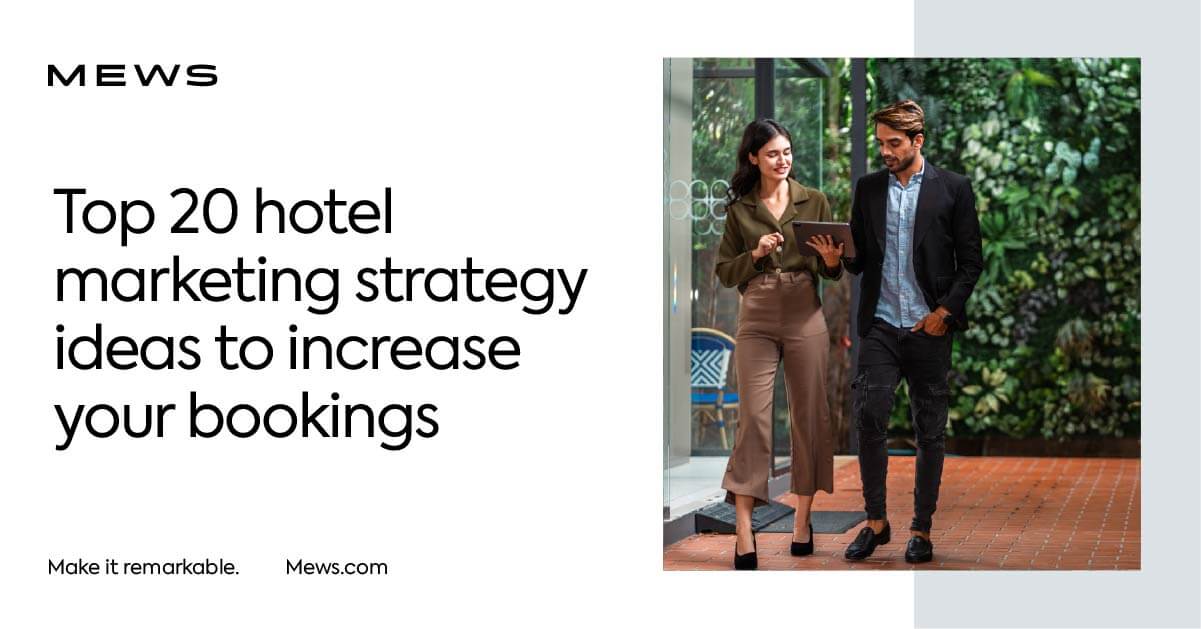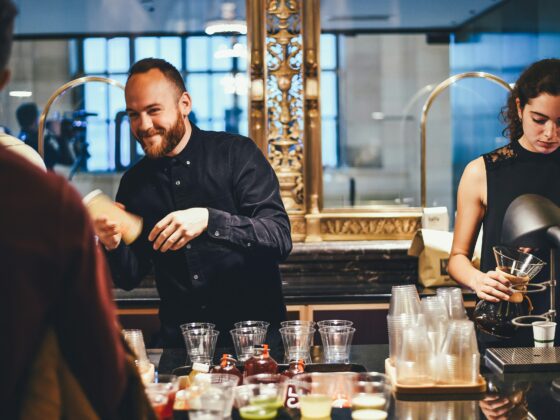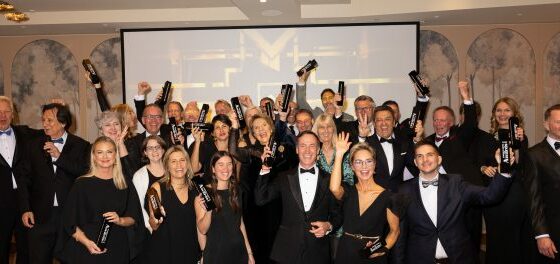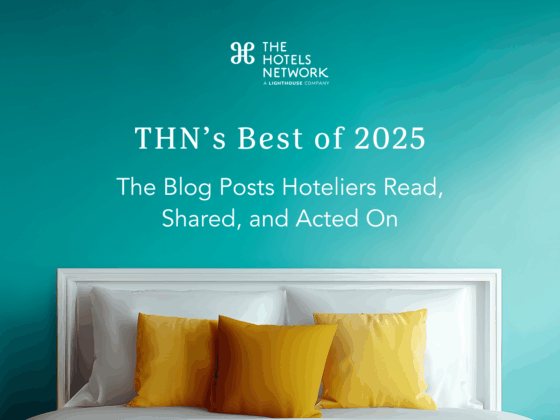23 ideas to optimize your hotel marketing strategy
A hotel marketing strategy should be dynamic, changing depending on the season, the year and the market trends. Below, you’ll find a list of some of the most up-to-date marketing strategies.
1. Invest in SEO for better website traffic
Your hotel’s website could be the best in the world, but without Search Engine Optimization, it runs the risk of not being discovered. With 75% of travelers starting their search for hotels on a search engine, you have a captive audience that you can capitalize on if your website is optimized correctly. This is why it’s important to invest in resources that will make the SEO of your website excellent.
Start by doing prolific keyword research to understand what your target audience is searching for. Turn those keywords that are relevant to your hotel and geographic area into engaging copy and messaging – and ensure your website is both mobile-friendly and fast-loading.
Another important part of SEO is link building, and there are few better ways to link build than by working with OTAs and metasearch engines, which is one of the first places travelers start looking. Not only will this sort of link building help drive direct bookings, but it will also increase visibility and help your website position better organically.
2. Optimize for AI search
As AI assistants like ChatGPT become key tools in how travelers research and book accommodations, it’s essential to optimize your hotel’s online presence to meet their criteria. Start by structuring your content clearly – use conversational, question-and-answer style formats that match how users phrase queries (e.g., “Is this hotel pet-friendly?” or “Does it overlook a canal?”).
Ensure your website is mobile-optimized, loads quickly and includes up-to-date schema markup, so AI tools can easily interpret your amenities, policies and location data. List your property consistently across platforms like Google Business, TripAdvisor and Booking.com with complete details on things like pet policies, parking, sustainability efforts and room types. The more structured and semantically rich your content is, the more likely you are to surface as a top recommendation when users ask questions like “Where should I stay in Amsterdam with a dog near the canals?”
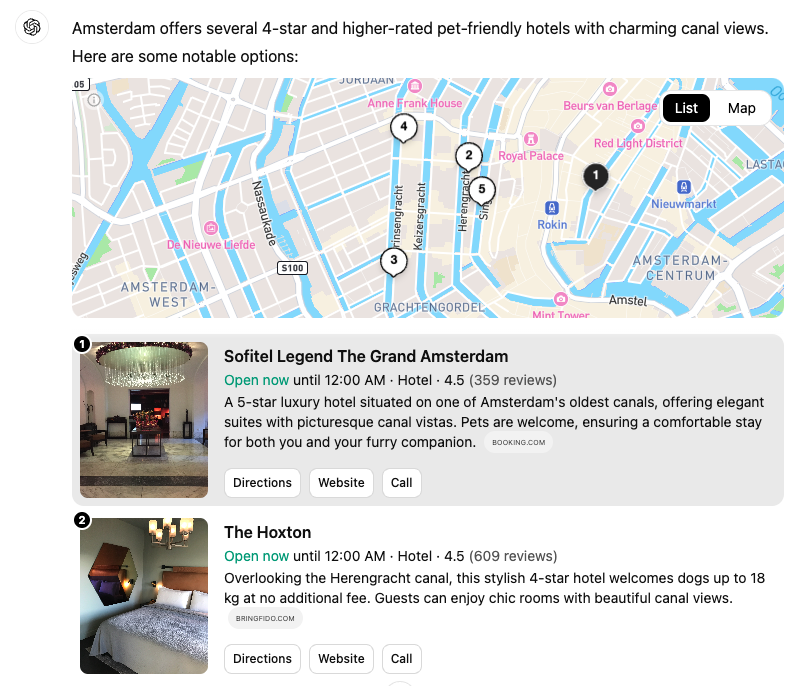
Being AI-visible isn’t just a tech update – it’s a strategic shift in how modern travelers discover your brand.
3. Don’t underestimate the power of data
With so much data now at your fingertips, one of the most effective hotel marketing strategies is using it to drive smarter decisions. Tools like Google Analytics offer powerful insights into how users interact with your website, which channels are generating the most bookings, and what demographics make up your target audience.
Another tool that is crucial here is your hotel management system, allowing you to pinpoint your different target groups based on an analysis of your existing customer base. In addition, the data you can unlock with a PMS’ hotel rate management software like Mews property management software is invaluable because you can use it to optimize inventories and maximize your profits. Plus, once you understand the data you can choose appropriate marketing messages to reach your objectives.

4. Tap into the buzz of heavily promoted events
While hotels naturally experience seasonal fluctuations, well-promoted external events can trigger unexpected spikes in demand that hotels can capitalize on. This is where dynamic pricing tools become invaluable. They allow you to respond in real time to sudden shifts in booking interest – whether it’s a major concert, a sporting event or a last-minute convention – so you can adjust rates and availability while demand is still climbing, not after it’s already peaked.
For example, imagine a globally recognized artist like Taylor Swift or Coldplay suddenly announces new tour dates for London. Within minutes, fans rush to buy tickets and, almost immediately, begin searching for nearby hotel rooms. Hotels that rely on static pricing or slow manual updates might miss this critical window – leaving money on the table or selling out rooms at pre-announcement rates. With a revenue management system in place, you can detect the spike in traffic or pick up cues from connected data sources and adjust your prices instantly. This means you’re not only keeping pace with market demand –you’re staying ahead of it, ensuring your hotel captures the highest possible revenue during moments of peak interest.
5. Define your unique value proposition
With a plethora of offers out there, why should guests choose your hotel over others? This is where your unique value proposition comes into play. Once you’ve defined what sets you apart – whether it’s a distinctive location, thoughtful touches or personalized experiences – you can weave that into your marketing messaging to truly stand out. Remember, your campaigns should be just as unique as the experience you offer.
While top-notch customer service is always at the heart of a great hotel stay, how you deliver that service is what defines your brand. Maybe you welcome guests with a signature cocktail at check-in, offer a complimentary bottle of wine in the room or showcase local treats as a surprise gift. These small, thoughtful gestures don’t require a big budget but create lasting impressions and help generate memorable guest experiences. And the better your guests are treated, the more likely they are to become advocates – sharing their stay on TripAdvisor, social media or through good old-fashioned word of mouth.
Take, for example, your marketing focus. Targeting broad search terms like “hotel in Amsterdam” is not only expensive but fiercely competitive. Positioning yourself as a pet-friendly boutique hotel close to a park instead instantly narrows your audience to a more specific and loyal niche. You’ll stand out to travelers who are actively searching for accommodations that meet their personal needs – such as pet owners who won’t book unless their furry companions are welcome. This kind of strategic positioning helps reduce marketing costs, boosts your visibility in AI-driven search results and niche platforms and drives more qualified traffic that is more likely to convert. In short, your unique value proposition isn’t just about what makes your hotel special – it’s how you turn that uniqueness into a business advantage.
6. Reward direct bookings
Direct bookings are like gold in the travel industry because you don’t have to share any portion of your profits with third parties, which is also ideal for a hotel’s profitability. This is why it’s so important to reward direct bookings and return guests. This could be through lower prices, special discounts, upgrades or even a little welcome gift in their room. Whatever you choose, ensure direct bookings and repeat guests feel valued, encouraging them to return and recommend your property to friends and family. Learn more about the Mews booking engine.
7. Map the customer journey and have touchpoints along the way
Mapping the customer journey is about understanding the different phases of the customer’s trip and making sure you have a unique message and strategy to lure them in with your marketing efforts each step of the way.
During the pre-trip phase, make it clear to your customers what sets you apart. Offer them opportunities to feel valued through upgrades and customizations. Be readily available to address their queries and consider having a 24/7 chatbot in place to handle common questions, preventing them from becoming a barrier to booking.
Once guests arrive, you want to give them a stellar experience with top-notch customer service. Have your staff regularly check in on their satisfaction levels.
After check-out, establish post-trip contact to thank them, request feedback, and offer rewards for future bookings.
8. Take advantage of social media
Social media is without a doubt one of the most important tools you can use to market your hotel and increase hotel revenue. Make sure you post engaging content regularly based on a content calendar. Hotel social media marketing strategies are great to drive traffic to your website and thereby increase the number of direct bookings, but your presence must be maintained on a regular basis.
Plus, social media is great for building brand awareness, and can be used to post deals and promotions, and give a human touch to your hotel by highlighting staff members or important sustainable initiatives. By catching travelers’ attention with social media, you can increase your chances of making conversions.
9. Invest more money during peak booking season
Find out when your guests are booking for the peak season and invest more marketing dollars during this period. You can check historic data to understand the busiest times of the year, when business is steady, and when it’s slow, and then adjust your ad budget accordingly.
For example, most people aren’t lying on a beach in the middle of summer thinking about their Christmas holidays, but as the cold sets in during fall, they’re more likely to start researching and making plans. Make sure you have an adequate ad budget allocated during these times to be able to capture these guests when they’re most frequently looking.
10. Identify target audience
Identifying your target audience is crucial for campaign success. By defining your audience, you can tailor your offers to appeal specifically to the right people.
For instance, understanding your ideal guest’s interests, travel motivations, booking preferences, and length of stay allows you to create a more effective marketing strategy that reaches travelers who match your guest profile.
11. Make sure your hotel website is appealing
Your website is like a modern-day business card, where guests can look at your facilities, what you offer, and decide if it suits what they are looking for. For that reason, your website should be appealing with original content, a well-defined tone of voice and visual photos that make your hotel look like “the place to be.”
You should also consider having special offers and deals that can only be booked on your website to encourage direct traffic. Make it easy to navigate your website, and make sure there are no boundaries to purchase. If you see that guests have abandoned their shopping cart, send push notifications as a gentle reminder to finish the booking.
To find out more on how to improve your hotel website performance, watch this episode of Matt Talks where our CEO Matt is joined Michael Fitzsimmons, VP of Growth at Mews, to discuss the critical role hotel websites play as digital business cards.
12. Optimize your cookie banners for UX
When potential guests are researching leisure stays, they often start looking early, browsing multiple sites over days or even weeks, and frequently consult with friends, family or fellow travelers.
A smooth, user-friendly cookie banner not only avoids disrupting their browsing experience but also sets the foundation for personalization. By obtaining the right consent, you can tailor content, offers and messaging to match their preferences and behavior. Whether it’s remembering previously viewed rooms, showing location-relevant packages or customizing language and currency, thoughtful personalization can make your website feel more relevant – building trust and nudging visitors closer to booking.
13. Don’t neglect your Google Business profile
While there are many search engines out there, the truth is it’s as if there was only one: Google. This is why it’s key to have an optimized Google profile with the correct contact details, location on Google Map, as well as listed amenities and appealing photos (rather than just user-generated ones). You should also respond to all reviews as and when they come in. Finally, make sure guests have the option to book directly from your profile.
14. Utilize paid search
Search engine marketing is an important aspect of marketing your hotel online. We’ve already spoken about organic search, but paid search is another way to complement these efforts. Travel-related keywords can be costly, so make sure you bid appropriately to position yourself above the competition. You can also do the same on metasearch engines like TripAdvisor and Skyscanner.
15. Make sure to keep a part of your budget for offline campaigns
Today it’s easy to only invest in digital campaigns, but guerilla marketing and other offline campaigns are just as important. You could sponsor an event, place ads in a relevant magazine or newspaper, or even erect a billboard at a highly trafficked metro stop. All these actions will help get your brand in front of potential guests.
16. Work with influencers
Influencers are now a core part of most marketing strategies because they have the possibility to increase your hotel’s brand awareness, reach, and positively influence behavior. Investing in quality influencers who create engaging content, especially those with a large following, can do wonders to increase bookings.
If you don’t have a huge budget, consider investing in micro-influencers who are still effective, but may be more willing to barter services in exchange for free services.

17. Practice reputation management
Reputation management is a key part of your marketing activities because it’s a way of showing potential guests that you genuinely care. It involves monitoring, responding and shaping public perceptions. Be sure to respond to all reviews, whether they are negative or positive, and keep a constant eye out for what people are saying about you online.
18. Engage in storytelling
Storytelling is how you get your brand out there. Particularly in the travel industry, people are far more likely to book when a property or place resonates with them and evokes an emotion. Additionally, people feel more connected when they share values with a brand. For instance, imagine the food at your restaurant comes from an organic farm that prioritizes sustainability and is managed by passionate local farmers. This kind of story helps guests connect with your brand and choose you over the competition.
19. Have a consistent tone of voice
A consistent tone of voice that is in line with your brand’s storytelling will help round out your marketing efforts and make you recognizable. Make sure that no matter what channel you publish on, your messaging is aligned with your unique value proposition. You can find out more about defining your hotel’s tone of voice here.
20. Organize events
Events are a great way to spread the word about your brand and increase bookings by helping to connect potential guests with current guests and locals. Events can help create this ambience of connection, and help get your hotel’s name out there, especially among locals who will have your hotel top of mind when it comes time to receive out of town guests.
21. Create themed packages
Packages and special offers are ideal to not only attract potential guests with a certain profile, but also to bump up the average spend by bundling services. This is a particularly strong strategy to use to increase bookings during low season.
22. Turn guests into brand ambassadors
Implement a referral and loyalty program to encourage guests to spread the word about your property. Reward them with special discounts or benefits for their next booking when they recommend you. Loyalty programs are an excellent way to keep guests returning and to increase bookings regularly.
23. Collaborate with local businesses
Collaborating with local businesses, whether it be to host an event, to create special discounts or to work with local artisans, chefs, tour guides, etc. is a great way to create synergies and encourage symbiotic relationships within the community. This is a very natural and fluid hotel marketing strategy.
How Mews helps with hotel marketing
1. Boost direct bookings and lower acquisition cost
Mews offers a built-in, mobile-first, commission‑free booking engine with real-time availability and embedded payments. This empowers you to capture more direct bookings, reducing dependency on OTAs and enhancing profitability.
2. First‑party data for smarter targeting
By assembling rich guest profiles – covering preferences, booking history and spend behavior – Mews enables smarter segmentation and personalized campaigns. You can leverage this goldmine of first‑party data to send context-aware offers, promotions and upsells, ensuring your marketing hits the mark.
3. AI‑powered Smart Tips = personalized touchpoints
Mews Smart Tips analyzes guest data in real time and surfaces actionable insights – like allergies, VIP status or past preferences – right at check-in or during service delivery. With over 5 million weekly insights generated, this enables your team to create personalized, emotionally resonant guest interactions.
4. Unified guest journey and upsell opportunities
Through fully embedded payments, pre-authorizations and upselling during online check-in, Mews captures extra revenue while securing verified guest email addresses. This allows for follow-up marketing and easier rebooking discounts, nurturing long-term loyalty.
5. Ancillaries and multi‑space bookings
Mews Spaces help you market and monetize hotel offerings beyond standard rooms – such as meeting rooms, parking, co-working and event spaces. This lets you tailor marketing by service type and tap into new revenue streams.
6. Dynamic pricing and revenue strategy
Atomize, a Mews company, provides robust revenue management and dynamic pricing capabilities – enabling you to adjust rates by demand and service type. Better pricing translates into sharper promotions and more effective marketing messages.
7. Seamless integrations
Our Open API, Mews Marketplace of 1,000+ ready-to-connect apps and strong partnerships ensure your booking and guest data flows seamlessly into marketing stacks. This helps power loyalty campaigns, email automation and targeted advertising.
How to create a hotel marketing strategy?
When it comes to developing your hotel marketing strategy, it’s an important mix of understanding exactly who your key target audience is, what tools you can use to reach them, and evaluating the effectiveness of your strategy to adapt and repeat. Creating a hotel marketing strategy involves the following:
- Defining your target audience and segmentation
- Analyzing competitors, which includes benchmarking and analyzing those in your comp set
- Creating a clear set of goals
- Developing brand identity with clear tone of voice and storytelling
- Deciding which marketing channels you will use and making sure they are optimized to facilitate easy booking
- Setting out key performance metrics that will define the success of your marketing strategy
- Monitoring results
- Adjusting your strategy and repeating
Conclusion
Having an optimal hotel marketing strategy is one of the most important ways of reaching potential guests in a highly competitive industry. Having a unique value proposition provides compelling reasons for guests to choose your hotel over a competitor’s. Start by understanding your target audience and identifying who your ideal guests are. Next, explore the channels they use, allowing you to tailor your marketing efforts to reach them effectively.
The above-mentioned strategies, while not exhaustive, are undoubtedly helpful tools for generating brand awareness, growing your business, and increasing bookings.
Understanding the Modern Guest

These twenty marketing strategies are the tip of the iceberg. There’s so much more to say about the modern guest and how their habits and expectations have changed, and as luck would have it, we’ve written a guide about exactly that.
